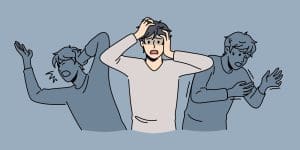Many symptoms of mental illness are disconcerting, but psychosis can be especially troubling for both those experiencing it and those around them. Whether you’re worried that your loved one is experiencing psychotic episodes or you’ve begun to experience new mental health issues, the first step is learning more about psychosis and its effects.
Read on to learn more about psychosis and what you can do to help yourself, a friend, or a family member facing this issue.
Contents
What Is Psychosis?

Psychosis is a broad term for a mental health condition that results from difficulties in processing information. Put simply, these challenges make it difficult for people to distinguish fact from fiction. Psychosis is not a mental illness in and of itself, but rather a symptom that can be caused by many different mental health conditions.
The two most common psychotic symptoms are hallucinations and delusions. Hallucinations are things you see, hear, or feel that aren’t really there. This could include hearing voices, which is a common sign of schizophrenia. Delusions are false beliefs about yourself, others, or the nature of reality. For example, a person experiencing psychosis may believe that they can read other’s minds, or that they are actually in outer space.
What Does It Mean When Somebody Has a Psychotic Episode?
An episode of psychosis is a period of time in which somebody experiences one or more psychotic symptoms. Psychotic episodes can last for days or weeks, often varying in intensity over time. Somebody can be rational and understanding before and after a psychotic episode, but during episodes they are unable to distinguish between what is real and what is not.
During a psychotic episode, the person experiencing psychosis is incapable of understanding why others can’t follow their thought process or reasoning. It is typically impossible to convince them that what they believe isn’t true. Psychosis makes it difficult for people to understand their own thoughts or communicate them to others.
Often, episodes will bring on grandiose delusions—feelings of false superiority or unusual beliefs about how important one is. For example, somebody having a psychotic episode may believe they are the target of a mysterious, all-powerful conspiracy, or that they are a famous celebrity and everybody recognizes them. These delusions could lead them to act in irrational, dangerous, or violent ways.
Common Signs of Psychosis
The category of “psychotic symptoms” includes a wide variety of different mental and physical behaviors. Most people with psychosis experience only a few of these symptoms. What these symptoms share in common is that they are all caused by a problem with how the brain perceives and processes information. Common symptoms include:
- Difficulty speaking in a way others can understand
- Disorganized thoughts or trouble thinking clearly
- Unwanted thoughts or thoughts you feel are not your own
- Feelings of paranoia or delusions of persecution
- Hearing voices that aren’t there
- Feelings of deep religious significance
- Emotionless tone or behavior
- Thoughts of suicide or acts of self-harm
- Social withdrawal, such as being unwilling to be around other people
- Hallucinations of places, people, or things that aren’t there
- Difficulty showering, grooming, or regularly eating
What Causes Psychosis?
Psychosis can be caused by a variety of sources. The exact reasons why psychosis develops are unknown, though new research is always being done as we continue to understand more about the human brain.
Mental health disorders that commonly cause psychosis are categorized as “psychotic disorders.” Psychosis can be temporary or long-term depending on the underlying cause. Most cases of psychosis are caused by psychotic disorders such as bipolar disorder or schizophrenia.
Psychosis can also develop as a result of drug abuse, trauma, or physical issues such as brain tumors or injuries to the head. Genetics, medications, and hormone imbalances are all factors for whether or not you develop a psychotic disorder.
Teenagers and young adults are most at risk of developing psychotic symptoms, with most people developing symptoms between 15 and 30 years old. Early psychosis, also known as first episode psychosis, is a term for the period when somebody first develops psychotic symptoms. It can often be particularly frightening, confusing, and distressing for the person experiencing it and for family members around them.
How Can I Help Someone With Psychosis?

The only way to help somebody with psychosis is to get them medical care and attention. Psychosis is a symptom of a broader health problem and requires a professional diagnosis to treat. In situations where somebody you know may be putting themselves or others in danger because of their psychotic symptoms, crisis care is available 24 hours a day to help de-escalate dangerous situations and get them the help they need.
Frequently, those with psychosis may turn to drugs or alcohol in an attempt to find relief from the symptoms of an untreated mental illness. When seeking treatment for somebody struggling to overcome both substance abuse and their psychotic symptoms, it’s important to find a rehabilitation program that is equipped to help people with dual-diagnosis disorders.
People with psychotic disorders often need help from those close to them in order to get treatment. It’s important to keep early warning signs in mind and help those experiencing psychotic symptoms find treatment that will work for them. The earlier people experiencing psychosis receive treatment, the better their long-term quality of life.
Find the Right Treatment for You
Trying to find help for yourself or somebody close to you who is struggling with psychosis or other mental health issues can seem like an impossibly difficult task. Port St. Lucie Hospital is dedicated to making that process as easy as possible by working with our patients to customize their care to fit their exact needs. If you have any questions about our programs or whether or not you should seek treatment, call our admissions specialists at (772) 238-7426, or fill out our digital contact form.


























